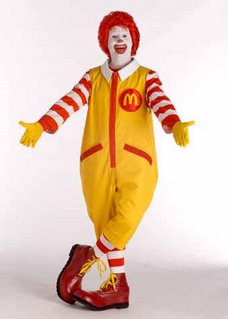
One would think not. Clowns are creepy bastards anyway. The New Brunswick Department of Education agrees. With the first part anyway. Story on Canada.com:
OTTAWA - In a Canadian first, the New Brunswick government has banned McDonald's corporate mascot Ronald McDonald from its elementary schools, but says the fast-food giant's controversial healthy living show can stay.The province's Department of Education made the announcement Monday after discovering the corporate clown had visited some schools this fall to promote McDonald's Go Active Canada program. The interactive show stars Ronald McDonald, who introduces video clips from Canadian Olympians delivering personal messages about leading a healthy lifestyle.
"You wouldn't use Joe Camel cigarettes to talk about your cessation program. It just doesn't fit,'' Jason Humphrey, spokesman for the Department of Education, said Monday in the wake of the ban.
Education Minister Kelly Lamrock elaborated in a letter to school boards, saying the brand-driven marketing "creates a contradictory and confusing message... Specifically, the use of brands reasonably known to be identified with unhealthy lifestyles is unacceptable.''
But critics say the province is going only halfway, pointing out the government has failed to take the next logical move by banning the McDonald's video pitching healthy living from its elementary schools.
New Brunswick schools can also continue sign up with McDonald's GO Active Fitness Challenge that can earn them up to $500 in sports equipment. Last year, 330 schools across Canada participated in the fitness challenge.
Ronald McDonald is still making the rounds in schools in other provinces, most notably in British Columbia, where the mascot turned up recently to deliver his healthy-living message on behalf of the 2010 Vancouver Winter Olympics; McDonald's is a top sponsor of the Games.
Erika Shaker, an education research fellow at the Canadian Centre for Policy Alternatives, says the issue that has boiled over in New Brunswick is part of a larger trend.
She described it as a perfect storm of cash-strapped schools looking for ways to raise money converging with companies like McDonald's keen to rebrand themselves.
"This is part of a wider movement of companies associated with foods that are not considered healthy and repositioning themselves as being interested in health. But it's not just a question of healthy foods, it's trying to refocus the discussion on active living,'' said Shaker. "And of course the backdrop to all this is the consistent underfunding of public schools.''
/
McDonald's has had a tough time rebranding itself since the 2004 release of the Academy Award-nominated documentary Super Size Me.
Filmmaker Morgan Spurlock ate three McDonald's meals a day for one month. At the end of the experiment, he had gained 25 pounds and suffered severe liver disfunction, a condition his supervising physicians attributed to his high-fat, high-carb diet.
McDonald's isn't the first company to feel pressure from the education sector.
The soft-drink industry has withdrawn voluntarily its carbonated drinks from elementary schools in Canada. And a few years ago, Kraft Foods announced it would stop all in-school marketing of some of its products, including Oreos and Kool-Aid.

No comments:
Post a Comment